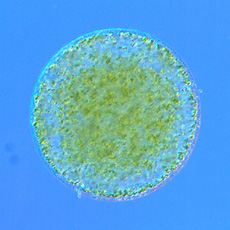T
he Antarctic marine ecosystem is an important hot spot of productivity, supporting global marine biodiversity through photosynthesis performed by microscopic marine plants (phytoplankton). Antarctic phytoplankton produce organic sulphur compounds that drive many marine food-web interactions and link ocean chemistry to global climate through the release of aerosols that influence cloud formation. Marine sulphur cycling is governed by cell-cell interactions between phytoplankton and bacteria. This project examines the role of sulphur compounds in Antarctic phytoplankton-bacteria associations and explores how changes in environmental condition, such as those expected from global warming, influence these fundamental relationships. This is important, because marine microbes perform invaluable ecosystem services, and any shift in their interactions and collective function will profoundly affect ocean productivity (fisheries yields) and chemical cycling (which controls our climate).
|

|
| Colonial Phaeocystis antarctica, a dominant, DMSP producing and bloom forming microalga in antarctic waters. |
|
